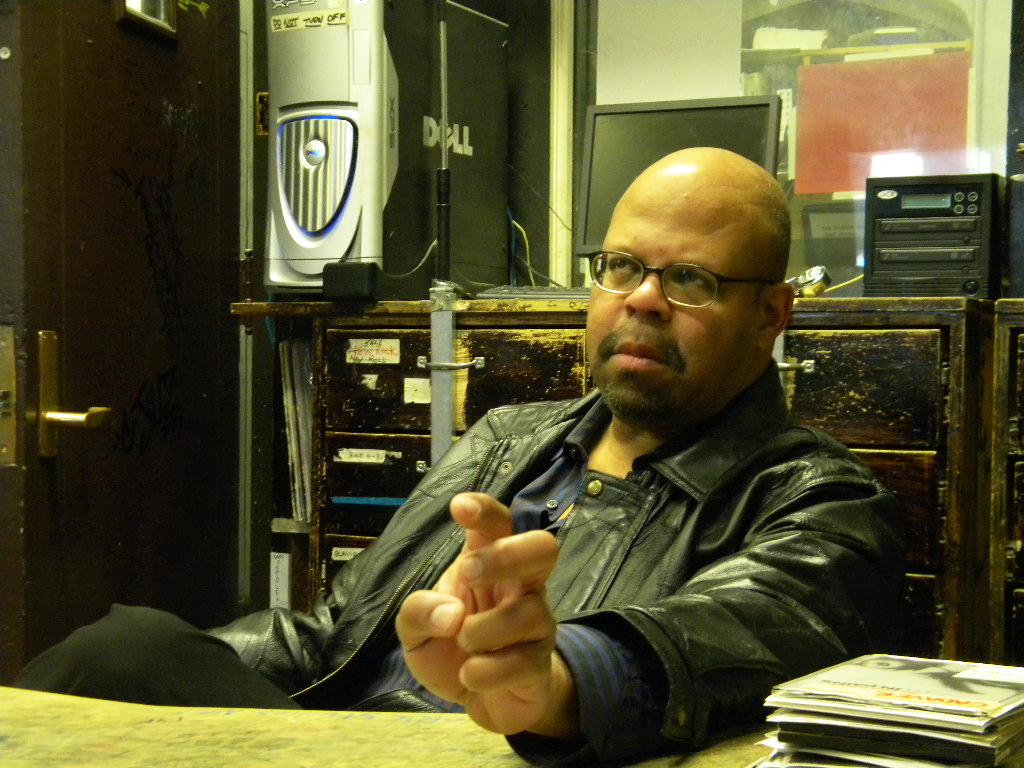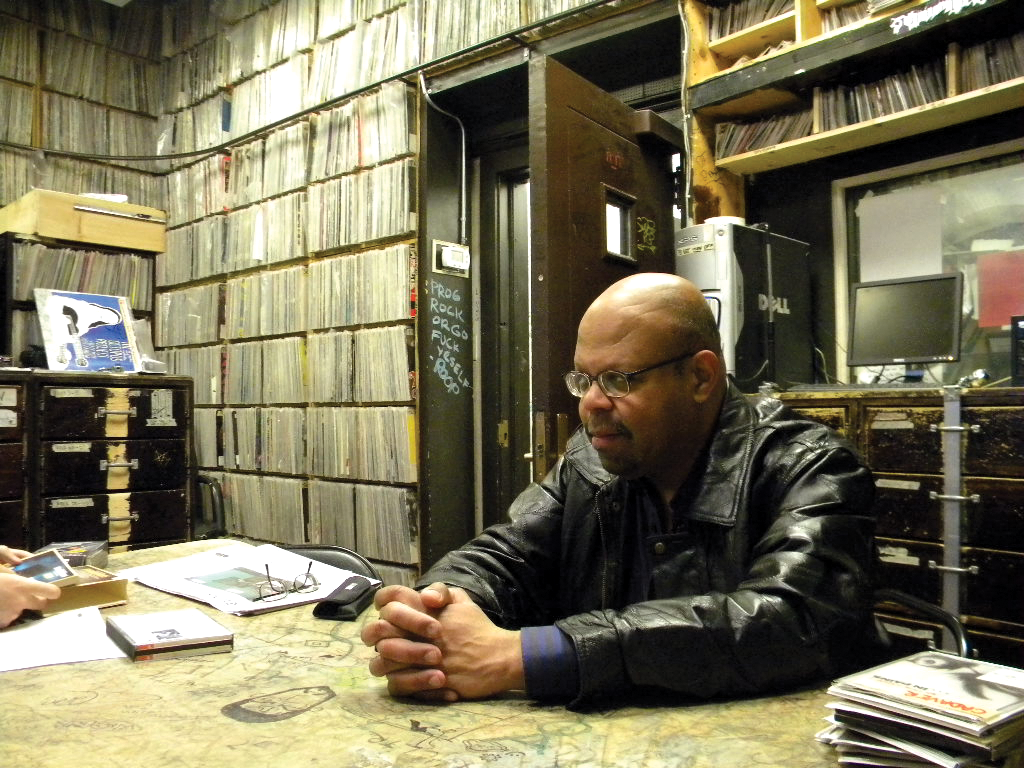
In addition to being a board member of Theaster Gates’s Black Cinema House and a film journalist for Indiewire’s “Shadow and Act”—a Ralph Ellison-inspired blog dedicated to the cinema of the African diaspora —Sergio Mims is also one of the most well-established DJs on WHPK’s classical format. For the second interview in our series profiling the veteran DJs of WHPK, Mims invited us into the studio as he played Schubert’s opera Fierrebras for the first half of his radio show—the unpretentiously titled program, “Stuff From My Collection”—to discuss his loves, hates and obsessions within the worlds of music and film.
How did you first get interested in music, especially in classical music?
I have to go back to when I was ten years old. My father used to give me all kinds of recordings to listen to and one day he gave me a recording of Gilbert and Sullivan’s The Mikado [and] I just gravitated towards it, I thought it was the happiest music I ever heard. I said, “Gee, I’d like to hear more like this.” At that time, there used to be a supermarket called A&P, back in the days long ago. They would sell classical records. There’d be a different one every other week, with notes, and later you could compile all the records into a binder. I still have it… and back then they would have record clubs. They had Columbia Record Club or RCA Record Club, and they’d announce that you’re getting this album for this month, and my father joined it for me, so I was just getting records.
And why classical music? I don’t know, that’s sort of an eternal question. It’s just something that spoke to me; I just gravitated towards it more than any other music.
Who are some of your favorite composers?
I can tell you who I don’t like. That’s easier. I like [almost] everybody, I can listen to everybody from Monteverdi to Stockhausen to Hans Werner Henze to Allan Pettersson. Who I do not like, who I cannot stand—I cannot stand Puccini, cannot stand Ralph Vaughan Williams. I always say, if I was captured and you wanted to torture me and get me to say everything I knew, put on La Boheme, or anything by Vaughan Williams, and I will confess everything. There are some composers who took me a while to warm up to, people who I like now who I didn’t like before, but I will never like Puccini and I will never like Vaughan Williams. Aaron Copland has a great quote about Vaughn Williams that perfectly expresses how I feel: “Listening to the Fifth Symphony of Ralph Vaughan Williams is like staring at a cow for forty-five minutes.” I don’t know why Puccini’s so popular. I always say, people who like Puccini don’t know music.
So I take it you’re not a fan of half the Lyric’s programming?
No! I won’t go [when they play Puccini]. And by the way, I’m glad you brought that up. Because of this show, it’s really expanded my horizons, I’ve been traveling even to Europe to see concerts. WHPK programming, and my show in particular, are known outside the country, so I have been to the Royal Opera House in London, I’ve been to the English National Opera, I’ve been to the Lucerne Festival in Switzerland. I was actually asked to be on a Swiss Radio Program last year, but I couldn’t do it. This is because of the show and [online] streaming. Classical music broadcast radio stations are a small community, there’s not a lot of radio stations left that broadcast classical music, and everybody tries to seek out what everyone else is doing.
How did you get started with DJing at WHPK?
Well, that was Jake [Austen, format chief for Public Affairs programming on WHPK]. Jake was after me for almost a year trying to get me to do a show on movies, which I still do about once a month on the station. But after a year I gave in, and I said, “OK, I’ll do it.” And I did it for about 3 or 4 years, I would bring in filmmakers, we would do a discussion, but I said, “Boy, I would really like to do a show on classical music,” because when I got involved with WHPK and I saw all the kinds of programming they have, I said, well, I would like to do something like that. And one summer a position was open for a slot, and I just jumped right in, and that’s been it ever since. Working and doing this show on WHPK has been a real unexpected joy for me.
Can you talk a bit about how you decide what music to play?
It’s “Stuff From My Collection.” That’s it, it’s my collection. I have a huge collection. I never repeated myself or played a recording twice, because I have that many recordings, and I can look and see what I’ve got and what haven’t I played yet. And I like to play extremes: I will contrast Mozart with Schoenberg. Things like that to play around with the programming, to give people a sense of what’s out there. I always want to do something different with my show. I don’t want to do the obvious stuff, I’ve never played Beethoven’s Fifth, I’ve never played Dvorak’s Ninth Symphony.
What I’m really interested in is giving people a broad view of what classical music is, which is why I’ve done everything from baroque to really 21st-century stuff. Just yesterday, I broadcast John Adams, his new work Gospel According to the Other Mary. I everything, from one extreme to the other and everything in between. And I hope that, if you didn’t like this, maybe I got something else coming up, or something next week that you’ll like. I gotta play something you like.
Speaking of your programming, I was looking through your blog on IndieWire and noticed you programmed the film Broken Strings about a year ago down at the Black Cinema House. It’s about interactions of African-American culture with classical music of the era, right? Does your work as film critic often line up with your interest in classical music?
Well, with Broken Strings, you have to think about how important that movie was at the time it came out. [The actor Clarence Muse] was playing a black man who was a classical violinist, and that was considered a very prestigious thing, somebody who actually made it. The movie, at the time, reflected the attitudes of the black community, [showing] someone who had gone beyond what society told him he could be. The other thing, too, was that you’ve never seen a black classical musician in a movie at that period; you don’t even see it today! And Clarence Muse, who almost always played slaves and degrading roles, came up with the idea for this picture, which was made independently and was considered a “race film.” He was basically trying to play a character that he would never be allowed to play in a Hollywood film. It’s fascinating, the film deals with a conflict between classical music and more popular black forms of music such as jazz and swing, and the final line was tremendous. It’s one of the greatest final lines of all time. But in that whole conflict, there’s that question, should we honor and appreciate what we are creating, or should we try to follow the past of what white people have been doing? It’s a very complex movie, much more complex than what people give it credit for.
I don’t really consider myself a film critic anymore, I consider myself a film journalist. I don’t write reviews much anymore—I will do reviews on the radio show, but I find it’s much more interesting to write about the business and what’s going on than, “Gee, I like this movie, and this is why I think you should go see it.” Anybody can do that. But it’s really just what I’m interested in, since I was a kid, I’ve always been interested in movies, seeing every film I could see, writing screenplays, even working as an assistant director years ago. It’s just part of who I am, I don’t try to stop and think, “Gee, why?” If I started to think about it, I would go crazy.




I’ve been at the station WHPK-FM for 38 years! Longer than ANY DJ on its current roster. Headed the Jazz Format for over 10 years. Has interviewed over 1,000 musicians with my program “What Is This Thing Called Jazz:Adventures in Modern Music” reaching its zenith in popularity. Written for many publications as a journalist/critic i.e. The Maroon; Grey City Journal; The Chicago Litarary Review; The Chicago Citizen; The Observer and many others….yet no one from the South Side Weekly has not interviewed me. Interesting
Hi Lofton, thanks for your comment. This series is ongoing and not necessarily comprehensive, though we’re trying our best to profile all of the DJs who have been on the radio for over a decade. I would be very interested in talking to you about the possibility of an interview (I think Sergio actually suggested that we do so after our interview with him). Feel free to message me (music@southsideweekly.com) or the head editor (editor@southsideweekly.com). We’re always open to ideas and pitches, though we would prefer to discuss these things over email rather than in the comments section of individual articles.